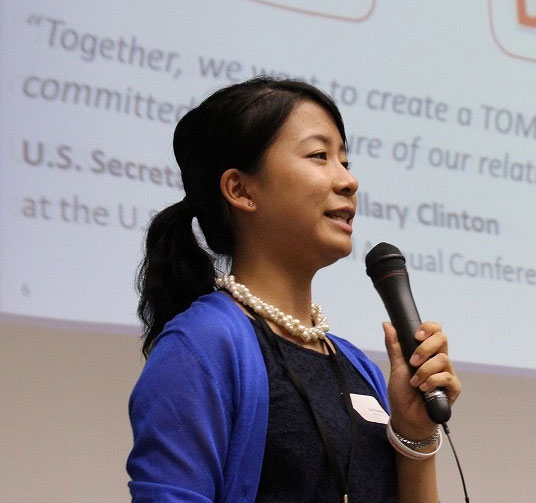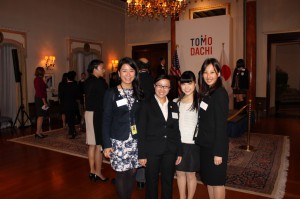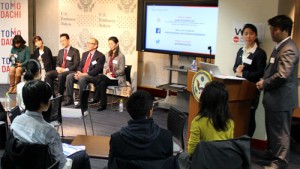TOMODACHI Generation: Eri Fumoto
 Keio University, Senior
Keio University, Senior
Favourite colour: Orange
Favourite food: Shepherd’s pie
Study Abroad: Dartmouth College, Hanover, NH
Hobby: photography, hot yoga
Favourite films: “Pride & Prejudice”, “About Time”
Favourite novel: “Remains of the Day” by Kazuo Ishiguro
Eri Fumoto joined the TOMODACHI internship in July 2015. She interned for 8 months, and had quietly but firmly taken the reigns of supporting the new interns joining in the fall, winter and spring. She demonstrated a level of professionalism that exceeded our expectations. Her last day at TOMODACHI Initiative was March 20, 2015. We were extremely sad to see her go, but are encouraged that she and her next generation will be entering the workforce with a passion to support others and drive change where change is needed.
How did you learn about TOMODACHI Initiative?
From a friend at Dartmouth who interned here.
What do you love about Japan and about the U.S.?
I like the notion of “omoiyari (thoughtfulness to others’ feelings)” and “ishin-denshin (understanding each other even without many word)”. In cultural context outside of Japan, Japanese can sometimes come across as being overly modest or quiet, because they tend not to articulate their ideas clearly as people are expected to in other countries such as the U.S. But I think these two notions represent very beautiful, unique aspects of Japanese culture.
On the contrary, I like how in the U.S., people appreciate you on how logically you can organize and articulate your thoughts. Practicing to convey my argument with clear-cut logic helped me in culturally diverse environment, where I couldn’t rely on “ishin-denshin” style of communication.
What do you like about the TOMODACHI internship?
 At TOMODACHI, you’re able to see the direct outcome of your work which is a really rewarding experience. It was amazing to see how the participants of the TOMODACHI Summer 2014 Coca-Cola Homestay Program departed nervously, then came back looking more confident. In the day-to-day tasks, sometimes we lose sight of the big picture, but when you see the students gain confidence and begin taking on the role as next generation of leaders, you can really see the result of your work.
At TOMODACHI, you’re able to see the direct outcome of your work which is a really rewarding experience. It was amazing to see how the participants of the TOMODACHI Summer 2014 Coca-Cola Homestay Program departed nervously, then came back looking more confident. In the day-to-day tasks, sometimes we lose sight of the big picture, but when you see the students gain confidence and begin taking on the role as next generation of leaders, you can really see the result of your work.
What’s the biggest change or impact since you joined TOMODACHI?
At TOMODACHI you’re surrounded by interns, staffs and program participants with diverse backgrounds. This environment carries considerable risk of creating misunderstandings. A panelist at a TOMODACHI career panel once said that “Humans are not that different – it’s just the style in which we do things is different” which has helped me mitigate that risk. I learned how to adjust my style depending on the situation and became more open to feedback from other people.
What’s the one key thing that you learned from a TOMODACHI event?
At the TOMODACHI NGO Leadership Workshop Program, Dr. Kristin Hibler from Mercy Corps spoke that “coaching is different from teaching – you have to ask good questions in order to coach” and that we have to “counter the natural tendency to judge – just because you see it, doesn’t mean it’s true.” I learned the importance of being inquisitive not just when I’m learning, but also when I’m in a position to “teach” others.
What was the biggest responsibility you had as an intern?
 Biggest responsibility I had as an intern was facilitating a panel discussion with five professionals from the field of medicine and research science. Facilitating discussions so that it flows naturally and hits necessary points, while keeping on track was more difficult than I expected. Internship at TOMODACHI Initiative gives you responsibilities and opportunities for personal growth, as well as great mentorship from the staffs and fellow interns to help you tackle those challenges.
Biggest responsibility I had as an intern was facilitating a panel discussion with five professionals from the field of medicine and research science. Facilitating discussions so that it flows naturally and hits necessary points, while keeping on track was more difficult than I expected. Internship at TOMODACHI Initiative gives you responsibilities and opportunities for personal growth, as well as great mentorship from the staffs and fellow interns to help you tackle those challenges.
What’s your most memorable experience at TOMODACHI?
Being able to meet with MUFG International Exchange students, especially the interview I did with Kazuma Tamura from Iwate Prefecture. I’ve never interacted with high school students from Tohoku before, and it was great to hear their stories first hand.
Message you want to tell the TOMODACHI Participants?
It’s alright to have stereotypes – some people say it’s bad, but I think it’s a natural tendency to have one. Just make sure that when you go abroad, keep your mind open to new things whether it fits your stereotype or not.
Don’t let opportunities fly by you – grab them before it disappears beyond your reach! I always keep in mind that “If it scares you it might be a good thing to try”, a quote by Seth Godin.
One quote that I really like: “However difficult life may seem, there is always something you can do and succeed at” by Stephen Hawking
I’ve seen a lot of Japanese students saying “I’m so nervous because I can’t speak English” before they travel to the U.S. Don’t always look at things you can’t do, focus on many wonderful things you can do!
How has a global background benefited you?
Language skills I acquired through my upbringing have certainly benefited me. For me languages are tools to widen the choices in life, and find things I really want to do. I think that my upbringing in Germany, England, and Japan also trained me to take a moment and think before making judgments, as my standard of “atarimae (what seems proper and obvious to you)” might not be the same as my counterpart’s. This helps me to identify the differences and bridge [cultural] gaps.
How does your past experiences lead to your future vision? Where do you see yourself in five years?
By 2020, I see myself working abroad, possibly married, and managing a marketing campaign and product launch that impacts many people’s lives.
Volunteer activities at Dartmouth, part-time job in Japan and internship at TOMODACHI all have similar commonalities – I love sharing my cross-cultural experiences, and encouraging young people to challenge themselves outside of their comfort zones.


